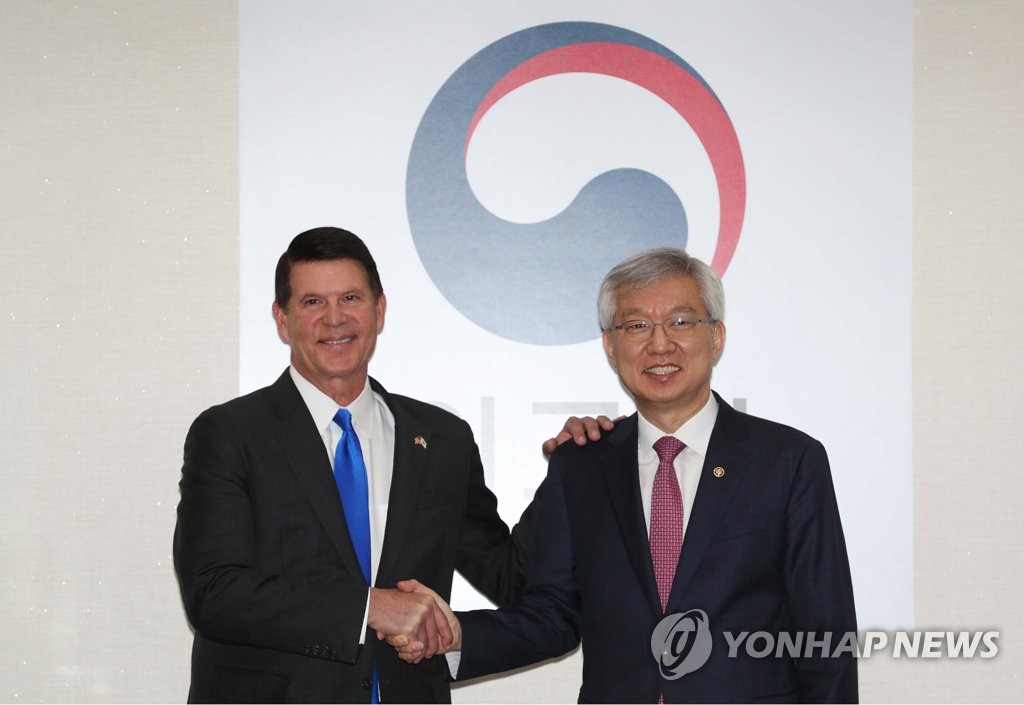South Korea and the United States agreed Wednesday to forge a broader strategic economic partnership in line with their regional policy initiatives for Southeast Asia and the Indo-Pacific region, the foreign ministry said.
The two sides reached the agreement during the fourth session of the Senior Economic Dialogue (SED) in Seoul, led by Second Vice Foreign Minister Lee Tae-ho and Keith Krach, undersecretary for economic growth, energy and the environment at the State Department.
The talks centered on identifying an overlap between Seoul's New Southern Policy (NSP) and Washington's Indo-Pacific Strategy (IPS) -- signature regional policy initiatives being pushed for by their respect governments -- and coordinating ways to advance the shared goals toward tangible progress.
"Both sides shared a commitment to forge a broader strategic economic partnership," the two countries said in a joint statement. "Towards this goal, both sides have put forward cooperative efforts under the NSP of the ROK and the IPS of the United States in line with the principles of openness, inclusiveness, transparency, and respect for international law."

The New Southern Policy aims to deepen Seoul's economic and diplomatic cooperation with the 10-member Association of Southeast Asian Nations (ASEAN) and India. The Indo-Pacific Strategy seeks to keep the region free and open by preventing attempts at blocking the global commons, such as freedom of navigation.
The joint statement also laid out a set of commitments to broader cooperation in areas of development, infrastructure, science and technology, digital connectivity, energy and smart cities.
Among them are working together to enhance water resources management in the Mekong River region in Southeast Asia and to spur more private sector investment in infrastructure in the Indo-Pacific.
Through the SED platform, they will also cooperate in research and development (R&D) for the 5th generation (5G) technology to help the ASEAN member countries and other partners in the Indo-Pacific better adopt the new technology, according to the joint statement.
Talks on 5G have drawn attention as Washington has been pushing its allies to join the move to ban the use of equipment made by Chinese tech giant Huawei, citing risks to national security. Seoul has been reserved about the U.S. request.
During the talks, they also agreed to cooperate in building smart cities in Vietnam through their state aid agencies, and in promoting health security, environmental protection and women's empowerment in the regions.
The next SED meeting is expected to be held in Washington in 2020.
"The SED has become a core pillar to further strengthen bilateral economic partnership under the robust (South) Korea-U.S. alliance," Lee said at the start of the meeting. "I'm pleased to know that SED has now matured into yielding some concrete projects and results, and I think there will be more to come in various areas."
In response, Krach appreciated the allies' shared goals in the regions, noting that strengthening cooperation in those fields is not just about enhancing bilateral ties but reaffirming commitment toward a global issue.
"That economic relationship extends far beyond trade and investment," he said. "It really extends to the global economic security area. That is so critical. Especially in times like this, to be able to leverage the power and innovation and resources in the private sector -- I know we're very like-minded on that." (Yonhap)

